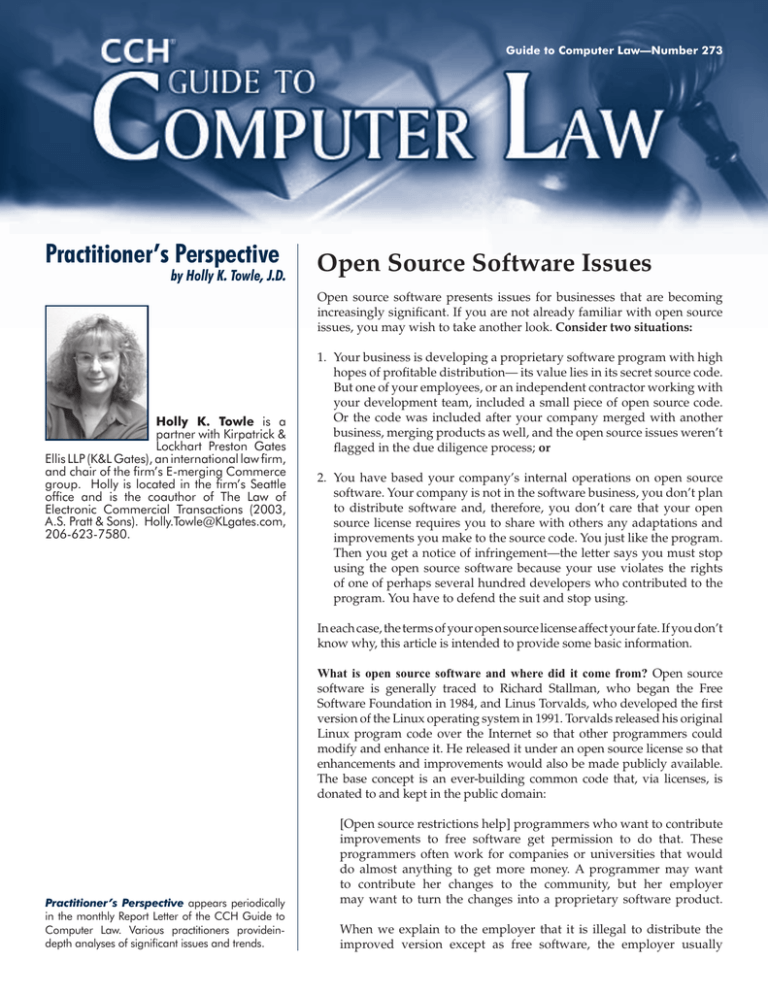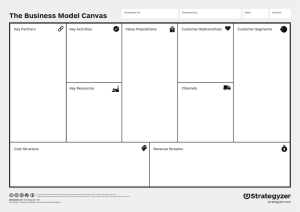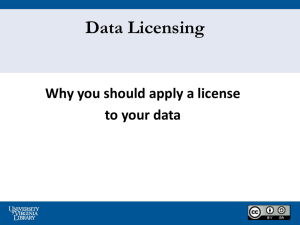Practitioner’s Perspective Open Source Software Issues by Holly K. Towle, J.D.
advertisement

Guide to Computer Law—Number 273 Practitioner’s Perspective by Holly K. Towle, J.D. Open Source Software Issues Open source software presents issues for businesses that are becoming increasingly significant. If you are not already familiar with open source issues, you may wish to take another look. Consider two situations: Holly K. Towle is a partner with Kirpatrick & Lockhart Preston Gates Ellis LLP (K&L Gates), an international law firm, and chair of the firm’s E-merging Commerce group. Holly is located in the firm’s Seattle office and is the coauthor of The Law of Electronic Commercial Transactions (2003, A.S. Pratt & Sons). Holly.Towle@KLgates.com, 206-623-7580. 1. Your business is developing a proprietary software program with high hopes of profitable distribution— its value lies in its secret source code. But one of your employees, or an independent contractor working with your development team, included a small piece of open source code. Or the code was included after your company merged with another business, merging products as well, and the open source issues weren’t flagged in the due diligence process; or 2. You have based your company’s internal operations on open source software. Your company is not in the software business, you don’t plan to distribute software and, therefore, you don’t care that your open source license requires you to share with others any adaptations and improvements you make to the source code. You just like the program. Then you get a notice of infringement—the letter says you must stop using the open source software because your use violates the rights of one of perhaps several hundred developers who contributed to the program. You have to defend the suit and stop using. In each case, the terms of your open source license affect your fate. If you don’t know why, this article is intended to provide some basic information. What is open source software and where did it come from? Open source software is generally traced to Richard Stallman, who began the Free Software Foundation in 1984, and Linus Torvalds, who developed the first version of the Linux operating system in 1991. Torvalds released his original Linux program code over the Internet so that other programmers could modify and enhance it. He released it under an open source license so that enhancements and improvements would also be made publicly available. The base concept is an ever-building common code that, via licenses, is donated to and kept in the public domain: Practitioner’s Perspective appears periodically in the monthly Report Letter of the CCH Guide to Computer Law. Various practitioners provideindepth analyses of significant issues and trends. [Open source restrictions help] programmers who want to contribute improvements to free software get permission to do that. These programmers often work for companies or universities that would do almost anything to get more money. A programmer may want to contribute her changes to the community, but her employer may want to turn the changes into a proprietary software product. When we explain to the employer that it is illegal to distribute the improved version except as free software, the employer usually CCH GUIDE TO COMPUTER LAW decides to release it as free software rather than throw it away. (See http://www.gnu.org/licenses/licenses.html#Intro, “What is CopyLeft?”) Open source software is often called “free” software—is it really? In this context, “free” doesn’t necessarily mean “no charge.” It does mean that the source code must be “open” for review. Many companies offering “open source” software do so for profit either by charging for the copy or charging for related services: The intention was that nobody would have to pay for “permission” to use the GNU system.… I have learned to distinguish carefully between “free” in the sense of freedom and “free” in the sense of price. Free software is software that users have the freedom to distribute and change. Some users may obtain copies at no charge, while others pay to obtain copies—and if the funds help support improving the software, so much the better. The important thing is that everyone who has a copy has the freedom to cooperate with others in using it. (See http://www.gnu.org/manifesto.htm#f1) The GNU web site says, “think ‘free speech’, not ‘free beer.’” Why would a business care if the software it licenses is open source or not? As with all software, the license is the key. Software is protected by a variety of intellectual property laws, including copyright, which limits a user’s ability to copy, modify or distribute the software except as permitted by the copyright owner. The terms of that permission are set forth in the license. Many open source licenses require users, who combine open source code with the user’s otherwise proprietary product, to make the source code for the whole product entirely open. That is why some speak of open source software as “infecting” other code. If your business plan depends upon keeping your code confidential, an “infection” is, obviously, a problem. Are all open source licenses the same? No. They are increasingly as variable as other software licenses and, correspondingly, must be read carefully to understand the rights granted and restrictions imposed (see e.g., http://opensource.org/licenses). Whether open source software is “better” or “worse” than other software depends on many factors, both technical and legal, and the user’s ultimate goals. The point here is that “open source” software licenses are not all the same, and it’s important to understand those license terms to avoid potentially unpleasant surprises. How can open source software affect your business if you only use it internally to run your business? Infringement. If you are modifying or copying the open source software, you may be exposed to a copyright infringement action by a rightsholder in the development chain who claims, for example, that someone else in the chain used code in violation of that developer’s license or didn’t obtain or qualify for a license at all. You can also be exposed to patent infringement claims, NUMBER 273 since the scope of patent rights obtained under a given open source license can be more limited than a user might expect. Claims of infringement can happen with any software. The difference with open source is that informal permission structures can enhance the risk of infringement claims. This kind of litigation has begun and will likely increase. The SCO Group, for example, is claiming that the Linux operating system infringes SCO’s proprietary rights. Defendant distributors of Linux disagree. SCO has also sued some large customers who are simply using the software. In some cases, voluntary funds have been established by companies promoting open source software to help defray the costs of defense, but the outcome in terms of expense and the ability to continue to use the software, is still unknown. Are open source licenses enforceable? An enforceable license is a defense to an infringement action and open source licenses should be just as enforceable as any other contract. The problem is that contract law requirements are not consistently met by open source licensors and licensees. If everyone, in fact, behaved as contemplated by the licenses, e.g., if every licensee developer ensured that the next transferee agreed to be bound by the relevant license, then there would be no problem. But that does not consistently happen. Frequently, the licensee does not know about the license or does not intentionally engage in conduct sufficient to pass muster as legal assent. There are many ways to consent to a contract in modern commerce and there’s nothing about open source that alters those choices—the problem is that frequently, none are used. That can create a chain with problems in several links or everywhere below the weak link. Contracts can also be formed by trade usage—so there may be questions whether you were aware of that usage, what it was, and whether you are bound by a contract you did not realize you had made. Even if a contract is correctly formed, particular terms might not be enforceable. For example, in several states with a nonuniform version of the UCC, implied warranties may not be disclaimed, yet most of the open source licenses require disclaimer (this assumes the UCC would even apply— although it should not apply, that is part of a debate in licensing law). To complicate this, some open source “licensors” adopt the legal position that their “licenses” are not contracts at all. Thus, contract law can be ignored. Under this view, open source terms are merely a notice given by the copyright owner of what can or cannot be done—a user who ignores the notice will not breach a contract, but will be subject to an infringement action. Why not just get permission from someone in authority? That’s easier said than done. Take a children’s story: many people have intellectual property rights in it, including the illustrator, the author, and the publisher. Now make the story a software product and add music, sound effects, code CCH GUIDE TO COMPUTER LAW allowing different endings, film clips and much more. All of those creators have intellectual property rights too. In a proprietary product, the publisher would typically obtain appropriate rights from the owners or authorized licensors of each of those components. Open source software is similarly comprised of contributions from many different sources, but they may come under myriad licenses or notices that may or may not, in fact, be effective. The legal result is less clear NUMBER 273 and less tested, although this will change over time as the proprietary rights in open source software are challenged in the courts. The point here is that a free lunch usually comes at some price and so does “free” or open source software. Users who are not aware of that price or its impact should learn more before imbibing, knowingly or unknowingly.

